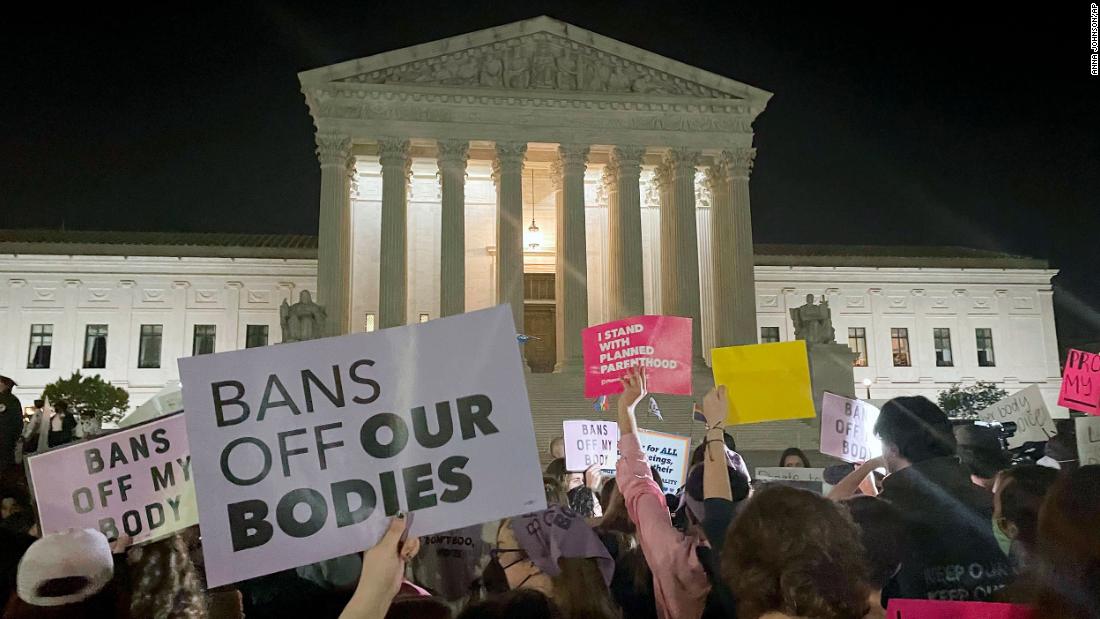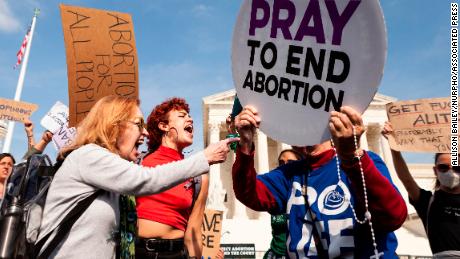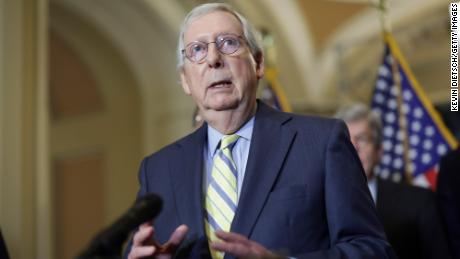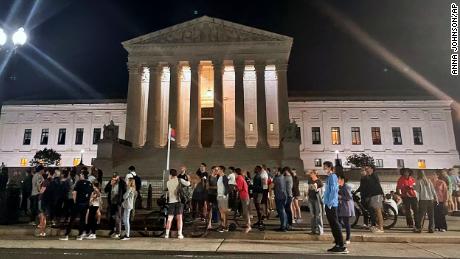
“With gridlock in Washington at an all-time high, the battle to protect reproductive health care will be fought in the states and won by Democratic governors,” said Wendi Wallace, deputy executive director of the Democratic Governors Association. “This draft opinion should serve as a wake-up call to anyone not paying attention to what’s at stake in governors’ races this November.”
The top spokesman for the Democratic Attorneys General Association made a similar argument — and implored Democrats to consider the shifting terrain as they decide where to direct their election season contributions.
“If Roe is overturned, this fight will move squarely into the states,” said Geoff Burgan, DAGA’s communications director, “and we need national donors, both large and small, to recognize that reality and invest in electing Democratic AGs this year.”
While Democrats at the state level quickly moved to underscore the stakes and, pointedly, what they planned to do if elected or reelected to their positions, Democratic campaign organizations on the federal level have struggled to articulate their plans going forward.
But even as the Senate Democratic group warned that Republicans were prepared to move forward with “federal legislation to outlaw abortion after six weeks of pregnancy,” the DSCC offered no promise that even a new and larger Democratic majority would even attempt to legalize abortion on the national level — a reality underscored on Tuesday by Democratic Sens. Kyrsten Sinema of Arizona and Joe Manchin of West Virginia, both of whom reiterated their unwillingness to consider scrapping the Senate filibuster, a 60-vote threshold that effectively gives Republicans a veto on most legislation.
Meanwhile, the leader of the Democratic Congressional Campaign Committee, the party’s House campaign arm, implored Democrats to vote in the fall.
“There has been a vote on the Women’s Health Protection Act,” she said, “which would do exactly that, and there were not even enough votes, even if there was no filibuster, to get that done.”
Democrats look local in search for message that sticks
But capitalizing on those sentiments has traditionally been difficult for Democratic candidates.
Democratic firm Slingshot Strategies recently tested messaging on the issue in a pair of swing congressional districts — Virginia’s 2nd and Michigan’s 7th, which are currently held by Democratic Reps. Elaine Luria and Elissa Slotkin, respectively. The polling found that abortion issues were a “powerful motivator” across the board and that those passions would escalate if the high court struck down Roe — large majorities in both districts were supportive of the 1973 decision.
Finding a political message that both motivated and persuaded voters to support Democrats in the districts, though, was more complicated. The polling ultimately found that immediately and consistently casting in local terms what would be an unpopular decision by the high court — while eschewing more familiar national talking points — was Democrats’ best bet.
“Successful Democratic messaging focuses on state-specific changes that could impose new government restrictions on abortion where voters live, with the incumbent Democratic Congresspeople as messengers rather than national Democrats,” said Evan Roth Smith, Slingshot’s pollster and co-founder.
Unlike their federal counterparts, Democratic statewide officials and candidates across the country responded to the news by flexing the immediate and tangible power their offices have in the fight over abortion.
“As the next Governor of Georgia,” said Stacey Abrams, who is running for the post again this year, “I will defend the right to an abortion and fight for reproductive justice.”
“Given the dynamics in the commonwealth of Pennsylvania, the next governor is going to have a bill on their desk that will restrict or outlaw abortion rights and they will have a decision to sign it or veto it,” said Pennsylvania Attorney General Josh Shapiro, who is running unopposed for the Democratic nomination in a state where Republicans control both legislative chambers. “I will, of course, veto it.”
Shapiro went on to condemn Washington’s “inability to codify Roe over many years” and said Pennsylvania Democrats “cannot afford to lose” the veto power currently held by term-limited Democratic Gov. Tom Wolf.
“In the absence of DC acting,” Shapiro said. “I am prepared to lead.”
A similar dynamic — with the GOP poised to act in legislatures they control — holds in Wisconsin and Michigan, where the respective Democratic governors, Tony Evers and Gretchen Whitmer, are vying for second terms this fall.
Michigan Democrats’ unique challenge
If Roe v. Wade is repealed, a 1931 Michigan law would snap back into place, one that makes performing or undergoing an abortion a felony in almost all cases — including rape and incest — with an exception only to save the life of the mother. Republicans control the state legislature, making a repeal of that law unlikely.
Whitmer in April sued the prosecutors in the 13 counties with abortion providers, asking the Michigan Supreme Court to determine that the state’s Constitution protects abortion rights and to block those prosecutors from enforcing the 1931 law.
Whitmer’s chances of victory in court are improved by the 2020 victories of two Democratic-backed state Supreme Court candidates, giving liberals a majority on the bench.
Michigan’s Democratic attorney general, Dana Nessel — who has discussed her own abortion when she was pregnant with triplets in 2002 and doctors told her she would miscarry all three unless she terminated one — is refusing to defend the 1931 law in court and has said she will not enforce it.
Nessel’s opponent, Republican Matt DePerno, has said he does not support abortion rights under any circumstances and, citing Politico’s report, said the draft ruling “will be such a great win for the unborn and for states’ rights.”
Democrats playing from behind in the states
“The state that you live in shouldn’t dictate fundamental American freedoms, like the right to bodily autonomy. But if this opinion comes down gutting Roe, that is where we are now,” Democratic Legislative Campaign Committee President Jessica Post said late Monday. “The fight is in the states.”
“This should be a tough lesson for Democrats,” Post said. “Our policymaking power in Washington is limited and the fight to protect abortion rights will now lie in state legislatures.”
This has been most evident this year, when Republican-controlled legislatures across the country have, in anticipation of a possible ruling on Roe, positioned themselves to pass strict abortion laws as quickly as possible. Much of this happened in places where Democrats could do little. In one week alone this year, Republicans in four states — Kentucky, Florida, Oklahoma and Tennessee — passed laws to curtail abortion access that were most similar to the Mississippi 15-week abortion ban that is currently before the Supreme Court.
The power of Democratic governors has also been on display, for example in Kansas, where Gov. Laura Kelly — who is also up for reelection in November — has stood in the way of several attempts by the Republican-controlled legislature to pass strict abortion laws in the red state.
On Tuesday, Kelly made clear she would continue to use her office to impede those attempts, saying that she has “always believed that every woman’s reproductive decisions should be left to her and her physician” and that she will “continue to oppose all regressive legislation which interferes with individual rights or freedoms.”


